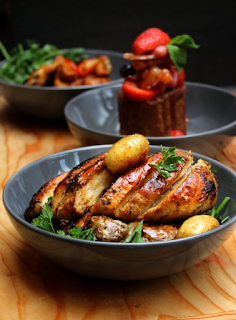The topic for today is food. Specifically “Clean Eating” vs “Junk Food” and the controversy around those two terms.
Clean Eating implies eating whole, minimally processed foods
that are organic, non-GMO, locally and/or sustainably sourced, no chemicals
added, no artificial ingredients, no use of herbicides, pesticides, antibiotics,
hormones, or other possibly toxic substances during the growth of specific
foods, animals and their by-products (eggs, dairy) that were free-range or
pasture-raised and THEIR food had none of the above mentioned products either.
Junk Food implies ultra-processed foods that have had a few,
some, or all of the previously mentioned substances added to them including but
not limited to dyes, artificial flavors, preservatives, emulsifiers, etc. It
also implies foods that may have whole ingredients but are also low in nutrient
quality (vitamins, minerals, protein, fiber, complex carbohydrates,
monounsaturated fatty acids), but are high in calories or high in excessive
amounts of salt, sugar, and fat that can lead to health issues or chronic
illnesses.
So, what’s the controversy here?
Well, to hear other professionals in the health and wellness
sector talk about it, there seem to be three camps around these two terms.
- Team Those-Are-Discriminatory-Terms-That-Promote-Diet-Culture
- Team You’re-Poisoning-Your-Body-If-You-Touch-Junk-Food---Eat-Clean-Instead
- And Team Somewhere-In-The-Middle
I would be part of that third group, for the record.
Team A (Discriminatory Terms) does not like the use of Clean
Eating or Junk Food, as it implies eating these foods is either good or bad/right
or wrong, and prompts the person eating to feel a certain way about their food
choices.
Team B (Poisoning Your Body) is concerned about what
your food choices do to your body and the negative impact choosing less nutrient
dense foods (junk foods) over more nutrient dense foods (clean foods) has on
your overall health and well-being, both long- and short-term.
Team C (In The Middle) is exactly that – in the middle. They feel like there is a way to balance eating foods that nourish your body, while still enjoying foods that aren’t as nourishing but are incredibly satisfying. And the terminology used is more of a reciprocal situation between the professional and their client/s.
My opinion on all this (since it’s my blog) is that the
nuances are tripping people up. Clean Eating and Junk Food are terms that commonly
describe nutrient density. Just like using the term “toned” or “toning” to
describe resistance training to build muscle mass and reduce fat mass. People
know what you’re talking about if you say toned, or lean, just like they know
what you mean if you say junk food or clean eating.
It’s not always necessary to say nutrient-dense, calorically-heavy, nutrient-poor, or high-nutrient-to-calorie ratio.
If you choose to take the time to say “high-nutrient-to-calorie
ratio” every time you talk about eating an apple, go for it. If you just want
to say, “I’m trying to eat healthier,” that’s also fine. I understand what you
mean. Other people understand what you mean.
And while no one wants to be shamed (nor should they be) for
enjoying junk foods, or made to feel guilty when they don’t “eat clean”, there
are countless studies that show eating healthy foods is better for you overall.
Google it.
There is also a point that Team B (Poison Eating) is taking it to an extreme as well. If you’re a competitive athlete or training for a specific fitness event, I get where you’re coming from that you must eat a certain way to fuel your body so it will perform correctly and do what you’re trying to achieve.
But for the average person, there are healthy ratios of
grilled chicken and broccoli to brownies. They can co-exist. In the same way it’s
possible to have pizza or a burger and make it a healthy (nutrient-dense) meal.
As for Team C (In the Middle), that’s pretty much where I
stand. I understand there are lots of issues surrounding food. Nuances that
must be taken into consideration, and that every circumstance is different.
Some extremes would have you believe that canned or frozen
fruits or vegetables aren’t healthy (or healthy enough), and that’s just not
true. Or that COOKING some foods makes them less healthy. Also, not entirely true. While
foods can lose nutrients during freezing, canning, or even cooking, they can also intensify
some nutrients during the cooking process. Or certain combinations of foods
cooked together can create a nutritional powerhouse, like tomato and olive oil.
Spinach and Lemon. Rice and Beans. Garlic and Broccoli.
As with everything in Health, Wellness, and Nutrition, it’s about finding the balance that works for you and sticking with it. Because, ultimately, that’s the bottom line. If you can’t stick with it, changing your habits and living a healthier lifestyle isn’t going to work in the long-term.
If you need to use the phrases “nutrient dense” or “calorically
heavy” as opposed to “clean” or “junk” to eat in a more nutritious way, go for
it.
If you want to focus on eliminating certain foods from your
diet because of poor nutrient content or how they are processed, go for it.
If you want to find a balance that works for you, you’re
able to incorporate it into your life, and you’re happy with the overall
results, go for it.
Just find what works for you and stick with it. You’ll get
there.
Don't forget to check out my free booklet, The Hidden Power of Food, with 14 recipes!





Comments
Post a Comment